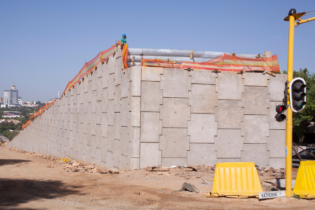Residents of Phoposane, Tlakgameng and Kudunkgwane, in North West province, are close to getting the long awaited tarred road that they demanded in protests in 2010. Contractor Liviero reports that its R219-million contract for the 42km stretch of road is in the final stages, and on track for completion during the first quarter of 2013.
In May 2010, the people of Tlakgameng took to the streets to demand a 22km tarred road between Tlakgameng and Ganyesa, explains Liviero CEO Neil Cloete. Four schools were set alight, causing damage estimated at R4 million. The schools were closed by the Department of Education and 9 092 pupils were affected. The MEC fast tracked the project and construction started in November 2010. “This project will contribute significantly to improving the lives of the rural communities in the Tlakgameng region,” Cloete states. Liviero’s contract entailed upgrading an existing gravel road to a double seal surfaced road, and included the construction of stormwater culverts and channels. The start of the project is in Ganyesa, which is 80km North of Vryburg, in the North West province. It also included 4.5km of block paved road, which, Cloete notes, increased the opportunities for job creation, the involvement of local labour, skills transfer and community development. “This project was not classified as a labour intensive project, but a substantial focus has been on community development. The road goes through four communities which are some of the poorest communities in the country. The aim of the project – apart from the construction of the road – was to develop and uplift these communities wherever possible.” Cloete says that a three-tiered training programme was implemented, consisting of an accredited skills training programme; a formal enterprise development programme; and social skills training, which empowered the local steering committee to play a proactive role in supporting the project. A training centre has been built and will later be used as a hospice, he adds. Numerous subcontractors have been developed through the training programme and are currently working on site. These include subcontractors working on kerbing, concrete channels, paving, brick work, stone pitching, edge beams and fencing. A total of 26 bus stops are also being constructed along the route to accommodate the local bus routes and improve public transport. The biggest challenge for Liviero on this project has been managing the community’s expectations and satisfying the need for development, says Cloete. “The extent of training and development on the project makes it unique. A total of 180 local community members have gained new skills, which has far reaching benefits for a community such as this. The challenge, going forward, is to provide sustainable opportunities for these new skills on other projects. This will require continuous investment in infrastructure by all levels of Government,” he contends.The project’s remote location also provided Liviero with some challenges. “Situated 540km from Johannesburg, this is one of the most remote sites that Liviero Civils has ever worked on. Material delivery and procurement has been a testing element of the project, since most materials are supplied from Gauteng. The remoteness of the project required efficient long term planning to prevent any delays in the delivery of materials.”
Skill shortages in the area also created challenges, as none of the local employees had ever worked on a construction site before. “Detailed safety training was undertaken, to ensure a safe working environment at all times,” Cloete says. A total of 350 000m3 of fill and layerwork material for this project was obtained on site from borrow pits. A mobile crushing plant was established, and crushed 55 000m3 of G5 to be used as base material. The total double seal quantity is 340 000m2, using a 13.2mm and a 6.7mm stone with 70/100 penetration grade bitumen. This was Liviero Civils’ first project for the North West Government. Cloete notes that Liviero’s focus on community development paid off, with the contractor surpassing its target, and successfully developing subcontractors who can now specialise in concrete work, brickwork, paving, stone pitching and kerbing. “We were also proud to reach 800 000 Lost Time Injury free hours on the project,” he concludes.
Cloete notes that Liviero’s focus on community development paid off, with the contractor surpassing its target, and successfully developing subcontractors who can now specialise in concrete work, brickwork, paving, stone pitching and kerbing. “We were also proud to reach 800 000 Lost Time Injury free hours on the project,” he concludes.







